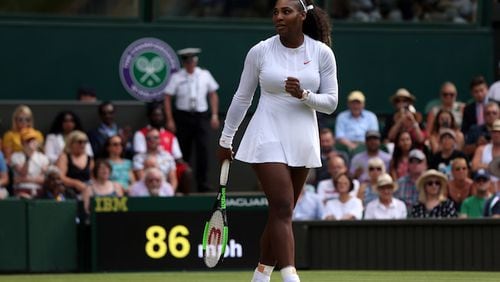The greatest athletes of our generation lost championships this year in blowouts but cemented their legacies as transcendent figures.
LeBron James' Cavaliers were swept in four games of the NBA Finals by the Warriors, losing the final game by 23 points before James announced he was headed for the Lakers as a free agent.
Serena Williams on Saturday lost 6-3, 6-3 to Angelique Kerber in the Wimbledon final — a rarity for the seven-time champion who had only dropped one set in this year's tournament before the final.
But it seems more certain than ever that Williams and James are defining a generation of athletics. And they're doing it not only with their prowess on their respective courts but by embracing their superstar status.
The debate about "the greatest of all time" will rage on. But like Muhammad Ali, they've transcended sports — tackling issues including race, gender and politics — and will be iconic symbols of our time.
James, 33, convinced even some of his most ardent doubters of his deserving legacy by carrying an otherwise train-wreck team to the finals. Shortly after, the four-time MVP — who has been openly political by endorsing candidates, criticizing President Donald Trump and talking about police brutality — opened doors to his "I Promise" school in Akron, Ohio, and called it one of his most important accomplishments.
For her part, Williams, 36, awed spectators by returning to competition just 10 months after giving birth to her daughter, Olympia, and undergoing life-saving surgeries for blood clots. She didn't just return, she went all the way to the Wimbledon final.
Everyone asked, "How?"
Commentators and fans nearly transformed Williams into a mythological figure. But despite competing like a superhero, what has made Williams so relatable and socially important is her vulnerability and honesty.
She has drawn attention to the disparate level of medical attention black mothers receive. She opened up about her decision to discontinue breastfeeding, her medical struggles and missing her daughter's first steps.
While interviewed on the court, Williams, who is a 23-time Grand Slam champion, was called "superhuman, Supermom."
"No, I'm just me," Williams said, holding back tears. "That's all I can be. But for all the moms out there, I was playing for you today. I tried. ... I look forward to continuing to be out here and doing what I do best."
This Wimbledon might be one of the first times I've heard an athlete mentioned as a mother without it defining her or being used as a stereotype against her. (I thankfully missed any diaper-changing jokes during Wimbledon.)
"I was really happy to get this far," Williams said. "It's obviously disappointing, but I can't be disappointed. I'm literally just getting started."
Williams' unparalleled talent, like James', is undeniable. But both athletes have transcended any "world's greatest" conversations by elevating the dialogue beyond their courts and their sports.






